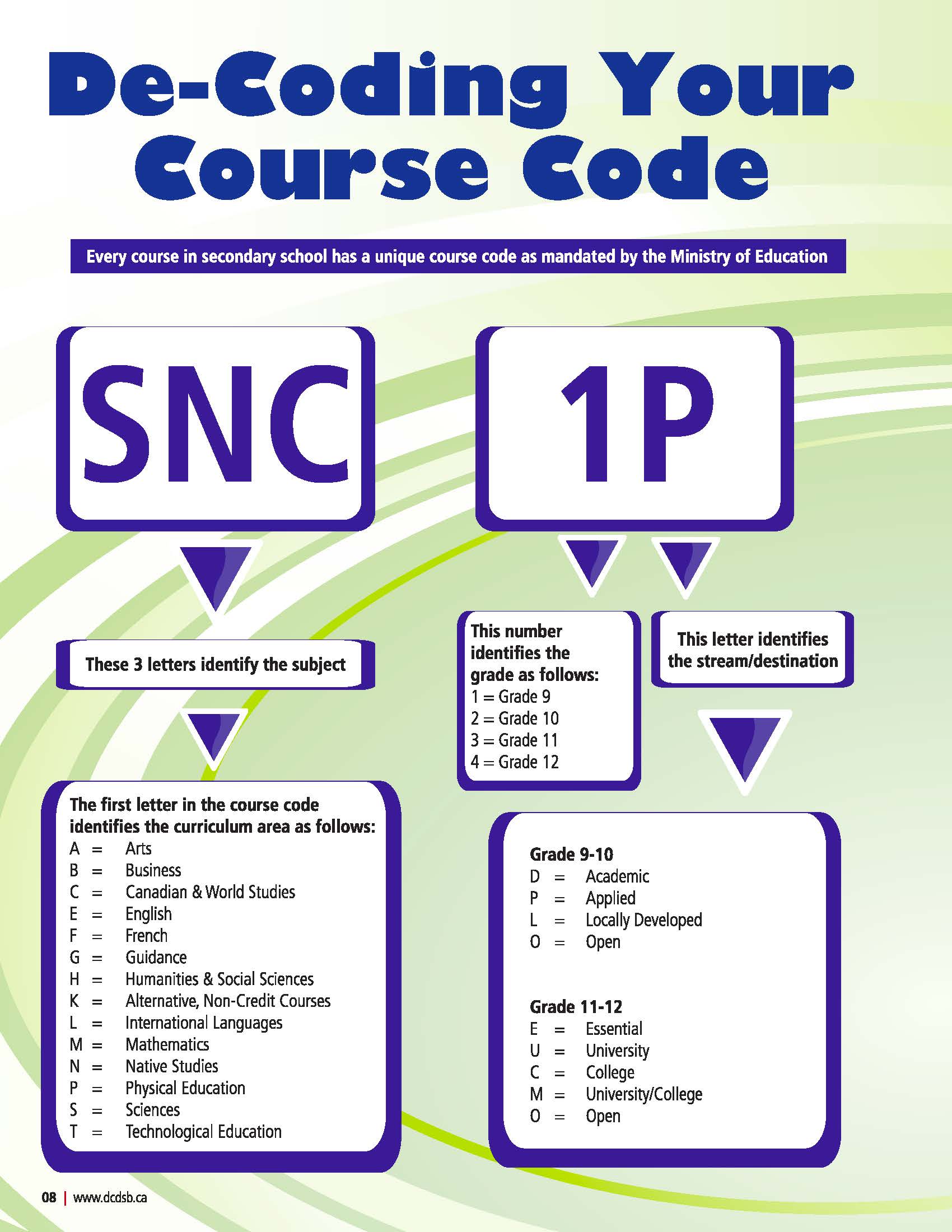Course Selection is an important component of Secondary and Post-Secondary Pathways Planning.
Course calendar
We offers a wide selection of courses at many different levels. Students and parent/guardians can access our course calendar (courses offered and descriptions) online using myBlueprint. DCDSB's Pathways to Student Success book and our Pathway Programs page is also valuable resources for Secondary Pathways Planning.
Courses offered for 2020-2021
| Grade 9 |
|
ADA 1O1 Dramatic Arts – open
AMV 1O1 Music Vocal - open
AVI 1O1 Visual Arts – open
BTT 1O1 Information and Communication Technology – open
CGC 1D1 Geography of Canada – academic
CGC 1DF Geography of Canada – French Immersion – academic
CGC 1P1 Geography of Canada – applied
ENG 1D1 English – academic
ENG 1L1 English – locally developed – Chosen only in consultation with Program Support
ENG 1P1 English – applied
ESL AO1 English Second Language students – open
FIF 1D1 French Immersion French - academic
FSF 1D1 Core French – academic
FSF 1P1 Core French - applied
GLE 1O1 Learning Strategies 1: Skills for Success in Secondary School – open – Chosen only in consultation with Program Support
HRE 1O1 Religion: Discipleship and Culture – open
HRE 1OF Religion: Discipleship and Culture – French Immersion – open
MAT 1L1 Mathematics – locally developed – Chosen only in consultation with Program Support
MFM 1P1 Foundations of Mathematics – applied
MPM 1D1 Principles of Mathematics – academic
PAF 1O1 Personal and Fitness Activities (co-ed) – open
SNC 1D1 Science – academic
SNC 1L1 Science – locally developed – Chosen only in consultation with Program Support
SNC 1P1 Science – applied
|
| Grade 10 |
|
ADA 2O1 Dramatic Arts – open
AMV 2O1 Vocal Music - open
ASM 2O1 Media Arts – open
AVI 2O1 Visual Arts – open
AWD 2O1 Visual Arts (Design) – open
BBI 2O1 Introduction to Business - open
CHC 2D1 Canadian History Since World War I – academic
CHC 2D1 Canadian History Since World War I – French Immersion –academic
CHC 2L1 Canadian History Since World War I – locally developed –Chosen only in consultation with Program Support
CHC 2P1 Canadian History Since World War I – applied
CHV 2O1 Civics (.05) – open
ENG 2D1 English – academic
ENG 2L1 English – locally developed –Chosen only in consultation with Program Support
ENG 2P1 English – applied
ESL BO1 English Second Language students – open
FEF 2DF French – Extended French - academic
FIF 2DF French – French Immersion - academic
FSF 2D1 Core French – academic
GLC 2O1 Career Studies (.05) – open
GLE 2O1 Learning Strategies 2: Skills for Success in Secondary School – open – Chosen only in consultation with Program Support
HFN 2O1 Food and Nutrition - open
HRE 2O1 Religion - Christ and Culture – open
HRE 2OF Religion - Christ and Culture – French Immersion – open
ICS 2O1 Introduction to Computer Studies – open
MAT 2L1 Mathematics – locally developed – Chosen only in consultation with Program Support
MFM 2P1 Foundations of Mathematics – applied
MPM 2D1 Principles of Mathematics – academic
PAF 2O1 Personal and Fitness Activities (co-ed) – open
SNC 2D1 Science – academic
SNC 2P1 Science – applied
TEJ 2O1 Computer Technology - open
TGJ 2O1 Communication Technology – open
|
| Grade 11 |
|
ADA 3M1 Dramatic Arts – university/college
AMV 3M1 Music Vocal – university/college
ASM 3M1 Media Arts – university/college
AVI 3M1 Visual Arts – university/college
AWD 3M1 Visual Arts (Design) – university/college
BAF3M1 Financial Accounting Fundamentals - university/college
BDI 3C1 Entrepreneurship: The Venture – college
BMI 3C1 Marketing – college
CGG 3O1 Travel and Tourism: A Geographic Perspective – open
CHW 3M1 World History to the Sixteenth Century – university/college
CLU 3M1 Understanding Canadian Law – university/college
COP 2O1 Co-operative Education – 2 credit (one Quad)
COP 4O1 Co-operative Education – 4 credit (two Quads)
ESL CO1 English Second Language students
FEF3UF French – Extended French - university
FIF 3UF French – French Immersion - university
FSF 3U1 Core French – university
GLE 3O1 Learning Strategies 3: Skills for Success in Secondary School – open – Chosen only in consultation with Program Support
HFC 3M1 Food and Culture – university/college
HPW 3C1 Working with Infants and Young Children - college
HRF 3O1 World Religions: Beliefs and Daily Life – open
HRT 3M1 World Religions: Beliefs, Issues and Religious Traditions – university/college
HRT 3MF World Religions: Beliefs, Issues and Religious Traditions – French Immersion - university/college
HSP 3C1 Introduction to Anthropology, Psychology & Sociology – college
HSP 3U1 Introduction to Anthropology, Psychology & Sociology –university
ICS 3C1 Introduction to Computer Science - college
ICS 3U1 Introduction to Computer Science - university
MBF 3C1 Foundations for College Mathematics – college
MCF 3M1 Functions and Applications – university/college
MCR 3U1 Functions – university
MEL 3E1 Mathematics for Work and Everyday Life – workplace
NBF 3C1 English: Contemporary Aboriginal Voices – college
NBF 3E1 English: Contemporary Aboriginal Voices – workplace
NBF 3U1 English: Contemporary Aboriginal Voices – university
PAF 3O1 Personal and Fitness Activities (co-ed) – open
SBI 3C1 Biology – college
SBI 3U1 Biology – university
SCH 3U1 Chemistry – university
SPH 3U1 Physics – university
SVN 3E1 Environmental Science – workplace
SVN 3M1 Environmental Science – university/college
TEJ 3M1 Computer Engineering Technology – university/college
TGJ 3M1 Communications Technology – university/college
|
| Grade 12 |
|
ADA 4M1 Dramatic Arts – university/college
AMV 4M1 Music Vocal – university/college
ASM 4M1 Media Arts – university/college
AVI 4M1 Visual Arts – university/college
AWD 4M1 Visual Arts (Design) – university/college
BBB 4M1 Introduction to International Business – university/college
BDV4C1 Entrepreneurial Studies/Venture Planning - college
BOH 4M1 Org Sudies: Org Behaviour & Human Resource – university/college
CHY 4C1 World History: West and the World - college
CHY 4U1 World History: West and the World - university
CLN 4C1 Legal Studies - college
CLN 4U1 Canadian and International Law – university
COP 2O1 Co-operative Education – 2 credit (one Quad)
COP 4O1 Co-operative Education – 4 credit (two Quads)
ENG 4C1 English – college
ENG 4E1 English – workplace
ENG 4U1 English – university
ESL DO1 English Second Language students
ESL EO1 English Second Language students
EWC 4U1 The Writer’s Craft – university
FEF 4UF French – Extended French - university
FSF 4U1 Core French – university
HFA 4C1 Food and Nutrition – college
HFA 4U1 Food and Nutrition – university
HHS 4C1 Families in Canada – college
HHS 4U1 Families in Canada – university
HPD 4C1 Working with School-Age Children & Adolescents - college
HRE 4M1 Religious Education: In Search of the Good- Ethics/Morality – university/college
HRE 4MF Religious Education: In Search of the Good- Ethics/Morality – French Immersion - university/college
HRE 4O1 Religious Education: “Church and Culture” – open
HSB 4U1 Challenge and Change in Society - university
HZT 4U1 Philosophy: Questions and Theories – university
ICS 4U1 Computer Science – university
MAP 4C1 Foundations for College Mathematics – college
MCV 4U1 Calculus and Vectors – university
MDM 4U1 Mathematics of Data Management – university
MEL 4E1 Mathematics for Work and Everyday Life – workplace
MHF 4U1 Advanced Functions – university
OLC 4O1 Ontario Secondary School Literacy Course – open
PAF 4O1 Personal & Fitness Activities (co-ed) - open
PLF 4M1 Leadership - Recreation and Healthy Active Living - university/college
PSK 4U1 Introductory Kinesiology – university
SBI 4U1 Biology – university
SCH 4C1 Chemistry – college – prerequisite SNC2P1 or SNC2D1
SCH 4U1 Chemistry – university
SNC4E1 Workplace Preparation Science - workplace
SNC 4M1 Medical Sciences – university/college
SPH 4C1 Physics – college - prerequisite SNC2P1 or SNC2D1
SPH 4U1 Physics – university
TGJ 4M Communications Technology – university/college
STUDY One spare only, any semester
STUDY4 Second Semester off
|
Cracking the course level code
Secondary school courses are identified with a six character code. The first five characters are consistent throughout every high school in Ontario.

Types of courses
The secondary school curriculum is organized into several different types of courses. In Grade 9 and 10, there are 4 levels: academic, applied, locally developed and open. Knowledge and skills are developed through theory and practical applications in all types of courses.
| Academic Level Courses (D) |
Students at this level:
- learn the essential concepts of a subject and explore related materials;
- emphasis is on theory and abstract thinking as a basis for future learning;
- students are creative and like to research and problem solve;
- students are independent learners with good to excellent learning skills; and
- students who do well in Grade 9 academic have generally performed in the Level 3-4 range.
|
| Applied Level Courses (P) |
Students at this level:
- learn the essential concepts of a subject;
- emphasis is on practical and hands-on application of concepts;
- students are more dependent learners, preferring discussions, teacher-directed or teacher-guided
learning and real-life applications;
- students who do well in Grade 9 applied have generally performed in the Level 2-3 range.
|
| Locally Developed Courses (L) |
Students at this level:
- learn the most essential concepts of a subject;
- require teacher direction and instruction to accommodate learning needs and to complete activities;
- improve basic literacy and numeracy skills;
- learning skills need improvement or require consistent practice and reinforcement; and
- students best suited for Locally Developed Courses have previously worked in the Level 1 range.
|
| Open Level Courses (O) |
| All students at all levels of academic abilities and learning needs and strengths can take an open level course. Expectations are designed to be appropriate for all students. These courses are usually in art and physical education. |
In Grades 11 and 12, courses are designed and offered to prepare students for post-secondary destinations. These destinations include: Apprenticeship, College, Community Living, University, and the Workplace. In Grades 11 and 12, there are 5 levels of courses: college, open, university/college, university, and workplace.
| College Preparation Courses (C) |
These courses were developed in collaboration with colleges and are designed to provide students with the skills and knowledge they need to meet entrance requirements for college programs and some apprenticeship programs. These courses emphasize concrete applications of the theoretical material covered in the course and also emphasize the development of critical thinking and problem-solving skills.
|
| Open Courses (O) |
| These courses are designed for all students, regardless of their post-secondary destination. They have been developed to provide students with a broad educational base and prepare students for active participation in society. |
| University/College Preparation Courses (M) |
| These courses were developed in collaboration with both universities and colleges, with content that is relevant for both university and college programs. They are designed to provide students with the skills and knowledge that are needed to meet the entrance requirements for specific university and college programs. These courses emphasize both theoretical aspects and related concrete applications of the course content. |
| University Preparation Courses (U) |
| These courses were developed in collaboration with universities and are designed to provide students with the skills and knowledge they need to meet entrance requirements for university programs. These courses emphasize theoretical aspects of course content and also include concrete applications. |
| Workplace Preparation Courses (E) |
| These courses were developed in close collaboration with representatives form a variety of workplaces. They are designed to provide students with the knowledge and skills needed for direct entry into the workplace or for admission to apprenticeship programs and other training programs offered in the community. These courses include cooperative education and work experience placements within the community and emphasize the development of employment skills, independent research skills and learning skills. |


